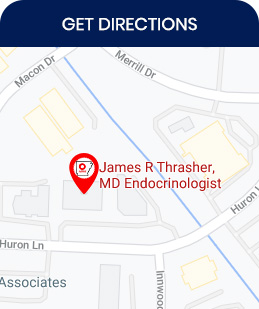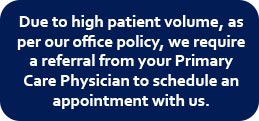Top Diabetes Specialist in Little Rock, AR
Find expert diabetes care with a specialist dedicated to helping you manage and improve your health. With personalized treatment plans and the latest in diabetes management, our specialists in Little Rock, AR, provide comprehensive care to support your long-term wellness. Visit James Thrasher, MD, FACE, and his team for detailed guidance at Arkansas Diabetes and Endocrinology Center. For more information, contact us or schedule an appointment online. We are conveniently located at 11400 Huran Lane, Little Rock, AR 72211.


Table of Contents:
How often should I see my healthcare provider for diabetes?
How can I tell if my diabetes is getting worse?
Are there early warning signs for diabetes complications?
Does diabetes increase my risk for heart disease?
At Arkansas Diabetes and Endocrinology Center, we understand that managing diabetes is a personal journey that requires regular monitoring and adjustment of your treatment plan. The frequency of your visits to our practice largely depends on your individual situation, including the type of diabetes you have, individual health goals, the severity of your condition, and your overall medical condition.
For those newly diagnosed with diabetes, we recommend more frequent visits – every three to six months. This allows us to establish a comprehensive treatment plan, monitor blood glucose levels, adjust medications and provide education and support.
If you have Type 1 diabetes, which requires rigorous monitoring and frequent insulin adjustments, you might need to visit our center more frequently, possibly every three months.
For those with Type 2 diabetes, visits can be less frequent if the disease is well managed. A check-up every six months may be sufficient, but if you are on insulin, have complications, or if your blood glucose levels are not within the target range, more frequent visits may be required.
People who have well-controlled diabetes, with regular visits every six to twelve months, are typically sufficient to assess overall health, review medications, and make any necessary adjustments. However, individuals with uncontrolled or complex diabetes may require more frequent visits to our center, possibly every three to six months or more, to address medication changes, manage complications, and provide additional support and guidance.
At Arkansas Diabetes and Endocrinology Center (ADEC), we understand the challenges faced by patients with diabetes. This chronic condition requires continual management, which includes monitoring your blood sugar levels and being aware of changes in your health. Worsening symptoms could indicate a progression in your diabetes.
Our team at ADEC emphasizes the importance of controlling blood sugar levels. If you’re experiencing persistent high blood sugar levels (hyperglycemia) despite medication or lifestyle changes, or if your blood sugar levels are fluctuating significantly, it might be a sign that your diabetes is progressing. Symptoms to watch for include:
● Increased thirst and urination
● Constant hunger
● Unexplained weight loss
● Fatigue and weakness
If you’re experiencing frequent infections or slow-healing sores, it could indicate that your diabetes is worsening. High blood sugar can impair your body’s natural healing and immune responses. Other symptoms to watch out for include:
● Blurred vision or vision changes
● Numbness or tingling in hands or feet
Remember, your mental health is just as important as your physical health. If you’re experiencing difficulty concentrating, mood changes, confusion, or disorientation, it is crucial to contact your doctor at ADEC as soon as possible.
Diabetes can lead to a range of heart and blood vessel problems. At ADEC, we help you monitor symptoms such as chest pain, shortness of breath, and irregular heartbeat. Other signs of metabolic changes include fruity breath odor, increased acid production in the stomach, and the presence of ketones in urine or blood.
Other signs of worsening diabetes include pain or numbness in the feet, kidney or liver function abnormalities, and difficulty breathing or sweating during exercise.
If you notice any of these signs or symptoms, contact us at ADEC promptly. Our experienced team can help manage your diabetes and prevent or slow the progression of complications. Remember, early intervention can improve treatment outcomes.
● Cardiovascular Complications: Experiencing chest pain or discomfort, irregular heartbeat, or swelling in the ankles, feet, or leg.
● Kidney Complications (Nephropathy): Swelling in the legs, ankles, feet, and sometimes hands, or the increased need to urinate or thirst.
● Eye Complications: Blurred or fluctuating vision, see spots or floaters, or have difficulty seeing at night.
● Neuropathy (Nerve Damage): Numbness or tingling in the hands, feet, or legs, sharp pain or cramps, increased sensitivity to touch, or loss of balance and coordination.
● Skin and Foot Complications: Skin conditions such as bacterial or fungal infections, itching, dry and cracked skin, non-healing wounds, or foot ulcers or infections.
● Other Signs and Symptoms: Unexplained weight loss, fatigue and weakness, frequent infections, and erectile dysfunction in men are also crucial signs that should not be ignored.
● Risk Factors for Complications: Our team at Arkansas Diagnostic Center is dedicated to helping patients manage and mitigate risk factors for complications such as poorly controlled blood sugar levels, long-standing diabetes, high blood pressure, high cholesterol, smoking, and obesity.
● Importance of Regular Monitoring: Regular medical check-ups and monitoring of blood sugar levels at Arkansas Diagnostic Center can help detect early warning signs of diabetes complications. Our team is ready to provide early intervention, such as adjusting medication, suggesting lifestyle modifications, or recommending additional therapies.
At Arkansas Diabetes and Endocrinology Center (ADEC) in Little Rock, we understand that diabetes, notably type 2 diabetes, is a chronic condition characterized by elevated blood sugar levels. This condition is a significant risk factor for heart disease, and we often refer to them collectively as “diabetic heart disease.”
Our medical team here at ADEC is specialized in understanding how sustained high blood sugar levels in our patients with diabetes can cause damage to the blood vessels and the nerves that control the heart, leading to numerous heart-related complications
At ADEC, we also manage other health conditions that increase the risk of heart disease in our patients with diabetes. These can include high blood pressure (hypertension), high cholesterol levels, and obesity.
Our professionals recognize that chronic diabetes causes systemic inflammation and oxidative stress, both of which accelerate the development of cardiovascular complications.
Our team at ADEC understands that the risk of heart disease in people with diabetes varies by gender. We provide personalized care to all our patients based on their specific needs.
At ADEC, we believe that despite the increased risk, proper management of diabetes and its associated conditions can significantly mitigate heart disease risk.
Receive expert diabetes care from a specialist committed to helping you manage your condition and enhance your health. With personalized treatment plans and the latest advancements in diabetes management, Dr. James Thrasher, MD, FACE, and his team at the Arkansas Diabetes and Endocrinology Center provide comprehensive care for long-term wellness. For more information, contact us or schedule an appointment online. We serve patients from across the state including areas such as Little Rock AR, Conway AR, North Little Rock AR, Pine Bluff AR, Hot Springs AR, Benton AR, Sherwood AR, Russellville AR, Jacksonville AR, Cabot AR, Searcy AR, Bryant AR, Jonesboro AR, Forrest City AR, Magnolia AR, Camden AR, Malvern AR, Batesville AR, Arkadelphia AR, Clarksville AR, Monticello AR, Heber Springs AR, Morrilton AR, Stuttgart AR, Greenbrier AR, Sheridan AR, and Vilonia AR. If the commute to Little Rock is too far or difficult we can establish a visit remotely by using telemedicine.







